- Home
- Grace Callaway
Abigail Jones (Chronicles of Abigail Jones #1) Page 2
Abigail Jones (Chronicles of Abigail Jones #1) Read online
Page 2
I had seen my employer from afar on several occasions and was well aware of his physical perfection. Up close, however, the power of his charm slammed into me with visceral force. I felt his presence; it called to some dormant and alarming part of me. Of their own accord, my eyes returned to his lean, long frame, the subtle, potent play of muscle beneath his dressing gown. I was drawn higher, to the dark dusting of hair above his collar and up the strong, sure line of his throat.
Mesmerized, I looked into his face. The earl was said to be in his thirties, a man in his prime. But his virile charisma struck me as timeless. It went beyond mere good looks—though he had those aplenty as well. His hair was wavy and thick and black as night save for the bold streaks of silver. As if chiseled by a master hand, his features radiated male grace from the straight nose and strong jaw to the clean slash of his cheekbones. But it was his eyes that most arrested. Vivid blue, framed by decadent dark lashes and heavy lids, they transformed his human beauty into something altogether more powerful.
These were not the eyes of a mortal, but a brooding archangel.
As if he sensed my thoughts, one corner of his mouth lifted. The impact of that lazy, sensual movement shivered through me, and my throat went dry.
Oh, he was an angel for certain—the fallen kind.
I became aware of the heated throb of my blood, a strange and painful ache that seemed to infuse my every breath. Mayhap it was the recent hallucination and the lascivious aftermath still humming through me. Or mayhap the foreign experience of being in close proximity to a member of the opposite sex. But I found I could not look away. I could not summon the strength to free myself from the spell weaving around my senses.
I inhaled sharply as his hands slid over mine. Sparks danced over my trembling nerves. Upon his ring finger, the gothic initial glinted.
"Soft," he said.
"S-sir?" My breath came fitfully into my chest.
"Your hands. You haven't been here long, have you?"
I shook my head, transfixed by the demon blue of his eyes, the rough graze of his fingers over my bare skin. Handling the reins, came the nonsensical thought. That could be the only reason for this robust, calloused grip from a gentleman of leisure. My heart thumped faster as his hold tightened. Regaining my wits, I tried to tug away. He did not release me, but used his stronger fingers to pry into my grasp.
Then I realized his intent: he was merely taking the tray from me. Shaken, I let go. My arms fell to my sides, leaden weight, and, indeed, I felt as if I was drowning.
"What is your name?" he asked softly.
"Abigail," I whispered, keeping my eyes trained on the black velvet lapel of his dressing gown.
"An apt name," he said, and I could hear the dry humor in his voice, "for a maid."
"Or a servant of God," I replied, before I could think twice.
I made the mistake of looking up. Something flashed in his eyes—hell fire came the hysterical thought—and then his mouth twitched. "And so you are."
"Lucien. I am waiting for my champagne. Either dismiss the maid," Lady Priscilla twirled a blonde ringlet with her finger, "or have her join us."
Her demand pierced my reverie. Good heavens, surely she could not be implying that she ... we ... Shocked, I broke away from his lordship's gaze. A single impulse gripped me: I had to escape. I had to run or else—
"May I go, my lord?" I whispered urgently.
"For now, Abigail-of-God."
I did not wait another moment. I fled from the room. His voice seemed to follow me as I escaped into the servants' corridor. Shaking, I stumbled along in the darkness, his words reverberating with each step.
For now.
TWO
That night, I woke, heart pounding, to utter darkness. My hands clenched the sheets, perspiration dampening my cheeks. As I surfaced fully, I became aware of the wetness glazing other parts of me—unmentionable parts—and the primal, almost painful need pulsing through my veins. My breasts ached; lower, a sensation of throbbing emptiness made me squirm in embarrassed anguish. I knew these were feelings no decent, respectable woman should ever have. I bit back a moan of distress, of unremitting shame. Tears squeezed from my eyes.
How I despised my affliction. How I hated the crazed visions and the lewd, exhausting dreams. Why, oh why, could I not be ordinary … normal, like everyone else?
Silently, I let the tide wash through me. Yet self-pity helped nothing so, after a few moments, I wiped my face on the pillow and looked to the other side of the room. In the dimness, I discerned the tranquil shape of Ginny on her narrow cot. Due to our junior status, we shared this windowless cell on the ground floor next to the kitchens. At first, given the unquiet nature of my sleep, I had dreaded having a roommate. I had feared disturbing her—and more so exposing myself. But fortune had blessed me in this one regard: it seemed Ginny could snore through the screams of hell.
Closing my eyes, I tried to regain sleep. My efforts proved futile. The energy humming through me was too urgent to ignore. Rising, I slipped on my thick woolen robe and slippers and exited the room. In the kitchen, Cook had left a low fire on the hearth; its glow reflected off the cast-iron cooking stove and the pots and pans neatly stacked on the kitchen dresser. I contemplated a visit to the larder. Such a thing was allowed, Mrs. Beecher had informed me, the master being generous with his servants.
At the thought of the earl, I felt my stomach quiver. Not out of hunger for food; no, this was a gluttony yet more sinful. The images from the vision returned. The pitiless blue gaze, the large, elegant hands at play. Touching, taking, setting me afire ... Feeling light-headed, I gripped the edge of the servants' dining table. My limbs shook, and my skin misted with feverish sweat. Never before had I experienced a trance as visceral and intense as the one tonight in the master's chambers. Even now, his clean, spicy scent lingered over my senses.
Did I imagine it all? Or did what I see actually happen between Lady Priscilla and the earl? And, if it did, why is it that I alone can see such things? Nay, more than see: why do such depraved and lustful feelings possess me?
The familiar, futile questions skirled in my mind. At times like this, I yearned ever more for Aunt Agnes. For the calm refuge of her arms, the steadiness of her wisdom. She alone had known of the visions, the curse that visited one female in every generation of my family. My mother, whom I had never known, had been thus afflicted. According to my aunt, she had died mere hours after giving birth to me; my first cries had echoed within the walls of her cell at Westhaven Sanitarium.
Mad, the doctors had declared. An imbalance of the blood that had taken over her weak female faculties. What else could explain a decent, God-fearing woman turning into a whore and one capable of producing a bastard at that?
Stuff and nonsense, my mother's sister had told me. Aunt Agnes had not believed in madness, only in moral discipline. A schoolmistress, she'd raised me according to her principles of intellectual improvement and self-restraint. From the onset of my monthly flux, when the startling specters of the senses had first begun, she'd trained me to use rational means to control the visions.
I will not lose you as I did your mother. Remember this always, Abby: while we do not know what causes these spells, we do know they are not real. They are illusions, nothing more. Therefore, logic dictates that you must never give into them. A disciplined mind—that is your salvation.
So she'd practiced the techniques with me again and again. Drilled them into me the way other parents might teach their female offspring proper manners and etiquette. Instead of acquiring the skill of polite conversation, I learned to distract myself by reading. In place of dancing, I became expert at willfully shifting my attention, at deepening my concentration. In lieu of having friends, I created mental pictures and practiced using those images to block the sudden hallucinations.
For without rhyme or reason the touch of an ordinary object could spring upon me trances of the most vile and licentious nature. There was no portent of disaster: my
first spell had been triggered by an unassuming kettle purchased from a passing tinker. As I'd picked up the copper handle, my world had morphed in a stupefying flash. My aunt's parlor disappeared, the cheerful clutter smoothing into opulent marble, a bathing room the likes I'd never seen before. Dazed, I'd found myself reclined in a sea of bubbles, in a body not my own ... and in the tub with me ... two footmen, doing unspeakable things ...
A sound slap had brought me back. To the parlor, to Aunt Agnes' stricken grey eyes.
The next vision occurred a few months later at the village stationer's. Straight from London, the clerk had declared as he handed me the pretty glass paperweight. As I'd cupped the smoothness, a kaleidoscope burst in my head. The colors faded to darkness, to a strange dungeon of perversity. The first stinging kiss of a birch had sent the paperweight crashing from my hands. After that, my aunt had restricted my exposure to foreign goods and kept me cocooned in our cottage. Only in this fashion had we been able to limit the number of ghastly visions.
Unfortunately, my sheltered upbringing meant I had few dealings with other people. On the rare occasion I was around others, I felt awkward, shy, always an outsider. As for friendships ... I shook away that memory, still painful after these many years. It seemed wherever we lived I quickly gained the reputation for being peculiar: the spinster's bastard niece, the one who kept company with books rather than other children.
But better odd than a lunatic, my aunt would say.
I let out a shaky sigh. Oh, Aunt Agnes, what should I do now?
Do what you do best, Abigail. Employ your mind toward gainful purpose.
My favorite activity had always involved books. A lover of the classics, my aunt had breathed life into Homer and Aeschylus during our evening readings by the fireplace. Words are the physicians of a mind diseased, the latter had written, and his in particular had a way of soothing me. How I wished that I might have kept Aunt Agnes' small collection of volumes—but they, too, had had to be sold. When the choice is between bread and books, one must feed the body first and worry about the soul later.
Just like that, a thought wriggled into my head. I chased it away immediately. But like an imp of the perverse, the harder I tried to push it from my mind, the stronger its hold. The image of the master's library unfolded in my head: the gleaming walls of books—hundreds, if not thousands—just sitting there, unused. Unnoticed. Who would know if I was to sneak in, read a chapter or two? Just enough to calm my disordered nerves.
It was a dangerous idea, a terrible notion.
Lighting a candle, I headed for the servants' hallway. As I traversed the narrow darkness, a plan took shape in my head. The library was one of the few rooms that could be accessed directly from this corridor. I would not dare to remove anything from that room, but I could slip in and read for a few minutes. If anyone came, I would simply escape back into the tunnel and no one would be the wiser. Besides, the only one to visit the library this time of night would be Earl Huxton.
At the thought of him, I experienced a nervous flutter in my belly. I shrugged it off. After his exertions of the evening, I doubted he had any inclination to read.
Lifting the latch, I entered the library.
The dark here was more than an absence of light: it was a hush, a heaviness befitting of a tomb. I stood on the threshold, frozen by sudden anxiety. Thoughts flashed through my head about the rash of thefts that had recently occurred in the household. Though all the servants, including myself, had been thoroughly interrogated, the culprit had not yet been found. If anyone came upon me now, would the worst be assumed? What could explain my presence here in the middle of the night?
My good sense commanded that I turn tail and run. But the scent of parchment and ink pervaded my nostrils, more tantalizing than any perfume, and I could see the dim outline of the shelves. Hundreds and hundreds of books just waiting there, beckoning, promising sweet escape. Just a few minutes, I told myself. A quick browse. What harm could that do? Using the candle's glow to ward off the shadows, I made my way into the heart of the room.
Having cleaned this space under Mrs. Beecher's tutelage, I could discern its grand dimensions even in the darkness. I stretched a hand out in front of me, moving forward until I touched the edge of the earl's desk. It had taken me the better part of an hour to polish the exotically carved rosewood. In the daylight, the magnificent curved panel of windows behind the desk illuminated any and all traces of dust upon the gleaming surface. Using a feather duster no bigger than my thumb, I had removed every speck from the scales of dragons and the petals of blossoming lotuses.
I followed the smooth, hard line of the desk until it disappeared from beneath my fingertips. Eight more paces and I reached the shelves. As I raised the candle, eagerness flooded me, washing away my earlier worries. I examined the jumble of well-worn spines. The books had been haphazardly stacked in all directions, with no apparent categorization by subject matter. I remembered Mrs. Beecher saying that his lordship's secretary had quit several months ago—over the master's exacting manner, apparently.
If the bookcases were any indication of the secretary's organizational abilities, I could not blame the earl. But that was none of my concern, and I could not afford to tarry. I scanned the shelves, my heart lifting when I spied a familiar title. With Prometheus Bound clasped in a hand that trembled, I considered the best place to read. There was a settee at the other end of the room, by the fireplace. Or I could just sit right here, on the floor.
The wicked imp crooked its finger again, and I found myself walking back to the desk, to the wingback chair behind it. Earl Huxton's chair. I knew I shouldn't. But I set the candle down and ran my fingers lightly over the large, masculine shape, feeling the firm leather cushions, the hard protrusion of the brass bolts. Here, the scent of him loitered. Leaning closer, I inhaled as deeply as an opium smoker might. The heady rush had me clutching the leather. Throbbing with shame and need, feeling more a sinner in this than anything else, I gave myself to the chair's forbidden embrace.
No sooner had I reclined in that decadent seat, then my gaze flitted automatically to the wall ahead of me. Ginny had been right: from the earl's chair, there was no escaping the lady above the fireplace. Though she was at least a dozen yards away and veiled in shifting shadow, I could still discern her presence. She seemed to me smug, her smile taunting me from her high perch. 'Twas as if she knew what I was about and relished my guilty trespass. A ghostly sensation fluttered within my breast.
Chastising my own foolishness, I flipped open the book and devoured the choral odes like one starved. As always, Prometheus' tale struck a resonant chord. Chained by Fate, he was a visionary who yearned to do right, who struggled haplessly against the demonic forces of Violence and Might. Engrossed in his drama, I did not hear the footsteps until too late. The door rattled in its frame. Far too late, I realized wildly, to make a dash for the servant's corridor; too late even to slip behind the curtains without setting a tell-tale ripple through the material. I pinched the flame, plunging the room into darkness just as the door swung open.
Footsteps fell upon the erratic beats of my heart. I shut my eyes—nonsensical in the dark, but such was my fright. The pounding in my ears, I was certain, would reveal my location. The footsteps advanced. Closer and closer, until I had to bite down on my fist to stifle the whimper of tension. There was a rasp of a matchstick, a hiss as a lamp was lit. As the glow intensified, I had a shocking view of hairy, muscular calves below a navy robe. I pressed back into the wooden cove. Prayed that my master—for there was no doubt it was he—would not look into the shadows beneath his desk.
A spasm jerked my muscles at a sudden thump overhead. I heard the shuffling of pages, and then the earl's legs moved out of view, only to return an instant later. There was another clink upon the table, and the sharp pungency of spirits wafted to me. The slosh of liquid was followed by a gulping sound; thrice over, this repeated. But apparently he found no comfort in the alcohol or the book, for he began to pac
e behind the desk, his stride stalking, furious.
A sense of unreality possessed me. This cannot be happening, I told myself. This had to be a fantastic nightmare from which I would soon wake. But he continued his menacing path back and forth, stopping now and then to toss down another drink. Petrified, I did not know what to do. What had I gotten myself into?
At the warning creak, my breath halted. His lordship had stopped pacing and sprawled himself into the chair. His knees invaded the margins of my hiding place, the tips of his slippers coming to rest no more than three hand-spans from where I crouched, shaking. The silence magnified every noise. I could hear the labored rush of my breath alongside the rustling of paper. Page after page after page sent anxiety ruffling down my spine.
Sweet God, was he planning on reading the entire book?
The chair squealed suddenly, and I had the panicked notion that the noise had been scraped from my own throat. Everything in me tensed, readied for exposure. But he remained motionless. Just ... sitting there. From my vantage point, his posture seemed hunched over, as if he had his elbows on the desk and his head in his hands. He stayed this way for an eternity: minutes or hours, I lost track. Finally, I heard a sigh—no, a sound more ragged than that—and the chair protested once again as the earl shoved back from the desk.
His hands came into my view, which now extended up to his mid-torso. His fingers paused over the belt of his dressing robe. As I watched, as one watches in a dream, he picked up one end of the velvet strip and tugged. The knot unraveled, and the panels of brocaded navy slid partially apart. I had to use my fist again; I bit down until I tasted blood. In my visions, I had seen this part of a man before. But always from another's point of view.
Never had I seen such a thing literally in the flesh.
During my hallucinations, I had heard various names used for this area of a man's anatomy. The coarse words had made no sense me—not until this moment. For before me now was no euphemism, no refined dart of love or Cupid's arrow. 'Twas in fact a truncheon, a weapon of bestial and violent strength. Quivering, I watched as he took that staff in hand. I knew how large his hand was; it had engulfed mine when he'd taken the tray from me. I saw that those same fingers now barely encircled the heavy up-thrust of flesh. I could not look away—could only watch on as a victim of Mesmer's might—as the hand took on a powerful rhythm.

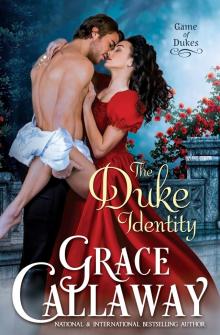 The Duke Identity: Game of Dukes, Book 1
The Duke Identity: Game of Dukes, Book 1 The Return of the Duke
The Return of the Duke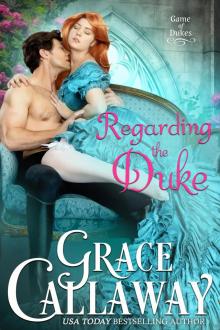 Regarding the Duke
Regarding the Duke The Duke Redemption
The Duke Redemption Olivia and the Masked Duke
Olivia and the Masked Duke Abigail Jones (Chronicles of Abigail Jones #1)
Abigail Jones (Chronicles of Abigail Jones #1)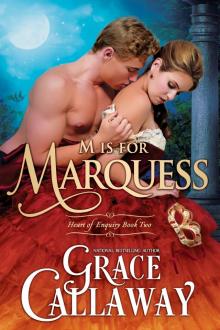 M Is for Marquess
M Is for Marquess Her Husband's Harlot
Her Husband's Harlot The Lady Who Came in from the Cold
The Lady Who Came in from the Cold Her Prodigal Passion
Her Prodigal Passion The Widow Vanishes
The Widow Vanishes The Viscount Always Knocks Twice (Heart of Enquiry Book 4)
The Viscount Always Knocks Twice (Heart of Enquiry Book 4) The Gentleman Who Loved Me (Heart of Enquiry Book 6)
The Gentleman Who Loved Me (Heart of Enquiry Book 6) The Duke Who Knew Too Much
The Duke Who Knew Too Much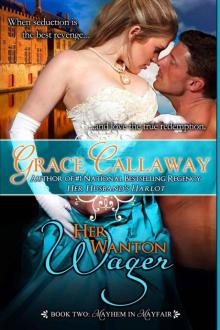 Her Wanton Wager
Her Wanton Wager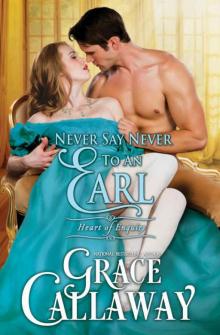 Never Say Never to an Earl (Heart of Enquiry Book 5)
Never Say Never to an Earl (Heart of Enquiry Book 5)